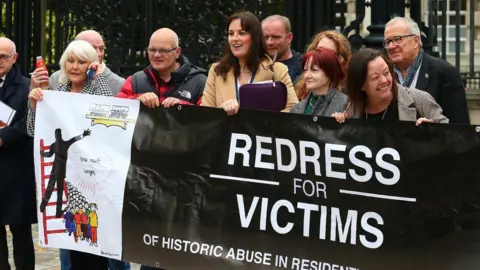Historical abuse: MPs pass long-awaited compensation bill
 PAcemaker
PAcemakerMPs have passed long-awaited legislation that will provide compensation to victims of historical institutional abuse.
It had been feared time would run out to pass the bill before Parliament is dissolved on Tuesday night.
It was fast-tracked through the Commons in just over an hour and has now received Royal Assent to become law.
There have been calls for compensation since the Historical Institutional Abuse (HIA) Inquiry ended in 2017.
It moved through all stages of the Lords last week, but the government had previously said there would not be enough time to grant it Royal Assent before Parliament's dissolution ahead of next month's general election.
'First of its kind'
On Monday, appeal court judges ruled that Stormont's Executive Office had the power to compensate institutional abuse victims in Northern Ireland.
Opening the debate in the Commons, Northern Ireland Secretary Julian Smith said the bill was the first of its kind in the UK, in terms of how abuse survivors should receive redress.
He paid tribute to those survivors, but also said it was "a tragedy" that more than 30 victims had died since the inquiry first published its findings.
Mr Smith also said the cross-party support in Parliament for passing the bill was testament to the strength of feeling about the issue.
It is believed to be the first time in parliamentary history that a piece of legislation has been debated on the final sitting day before dissolution.
Margaret McGuckin, from the group Survivors and Victims of Institutional Abuse (SAVIA) said she was delighted with the result, but it had taken a long time.
"It was constant lobbying, pleading and begging," she said.
"I have to commend Julian Smith, who is just a wonderful gentleman and if he had been in that position many years ago I feel he would have got this through," Ms McGuckin added.
"We refused to take 'no' for an answer. We refused to let them say 'yes, it'll be done after the election'."
Patrick Corrigan of Amnesty International said it was an "historic day in the long campaign for justice" for the many victims of abuse in Northern Ireland.
"We salute the victims and survivors who have courageously led this campaign, who have told their stories and brought their calls for justice to the heart of government," he added.
It is not clear when the government will begin to issue payments, but Mr Smith said civil servants are working with the Northern Ireland Office to progress the scheme as quickly as possible.
'Justice for victims'
Jon McCourt, from campaign group Survivors North West, credited former NI secretary Peter Hain for pushing the bill "right back to the front of the agenda" by speaking up for it in the House of Lords.
"When I see this Royal Assent come through today, then I'm going to know we got what we set out to get - justice for victims and survivors of historical institutional abuse, " he said.
It examined 22 residential institutions run by religious, charitable and state organisations and its remit covered a 73-year period ranging from 1995 back to the foundation of Northern Ireland.
The inquiry chair Sir Anthony Hart recommended in his report that all victims of institutional abuse should receive tax-free, lump sum payments ranging from £7,500 to £100,000 from a government-funded redress scheme.
However, the legislation stalled after the collapse of Stormont in 2017.
 Pacemaker
PacemakerThe Executive Office had worked on draft legislation but in May this year said it could take the matter no further and urged the Northern Ireland secretary to pass it.
The bill will set up a redress board to administer a compensation scheme and also aims to create a statutory commissioner to advocate for victims of institutional childhood abuse.
It was included in the government's Queen's Speech in October and was one of the first bills introduced in the current parliamentary session.
Tuesday marked the final day of Parliament before dissolution.
